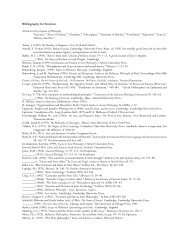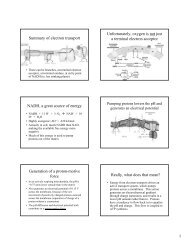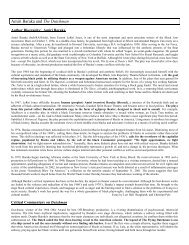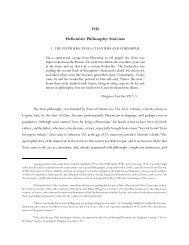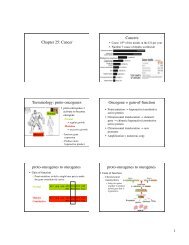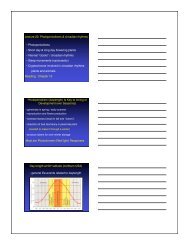V. VERB QUALITIES - UW-Parkside: Help for Personal Homepages
V. VERB QUALITIES - UW-Parkside: Help for Personal Homepages
V. VERB QUALITIES - UW-Parkside: Help for Personal Homepages
Create successful ePaper yourself
Turn your PDF publications into a flip-book with our unique Google optimized e-Paper software.
Remember that time and tense are not always the same thing. Either the simple present or<br />
present progressive can be used to refer to a future action by adding an appropriate<br />
adverbial:<br />
(8) I've had it with parking here. Next semester I walk to school.<br />
(9) I am walking to school tomorrow, unless you'd like to give me a ride.<br />
One might even be able to use the past progressive in a sentence like (9). Certainly, a past<br />
progressive sentence like (10) below is almost always a present-time equivalent to to the<br />
alternatives which follow:<br />
(10) I was wondering if you could bring me a beer.<br />
(11) I am wondering if you will bring me a beer.<br />
(12) I want you to bring me a beer.<br />
(13) Bring me a beer!<br />
There are some verbs and adjectives which seldom or never take the progressive. Such<br />
verbs and adjectives are called stative because they characteristically represent states of<br />
being. The opposite of stative is dynamic, a category in which most verbs and adjectives<br />
are found but a name one need not learn. Adjectives can also be classified as dynamic or<br />
stative, another way in which they resemble verbs. Explicit attention to the progressive is<br />
mainly important <strong>for</strong> non-native speakers and speakers of non-standard dialects which delete<br />
the progressive be along with the linking verb be. The <strong>for</strong>mer may produce sentences like<br />
sentence (14), misusing the progressive with a stative verb, and the latter may produce<br />
sentences like sentence (15), neither of which is acceptable Standard English:<br />
(13) ?? I am believing you now.<br />
(14) * The boss going out of his mind.<br />
In the sentence diagramed below, "getting" is a linking verb equivalent to "becoming," and<br />
"interesting" is used as an adjective. We have two verbs in this sentence, and the VP headed<br />
by "getting" is shown as a complement within the VP headed by "is." The way trees with<br />
auxiliary verbs are drawn has changed some through the years, but this is one widely<br />
accepted way. Sentences with more auxiliaries can have verbs which take verb phrases as<br />
their complement inside of verb phrases which are themselves complements of a verb, and<br />
so on.<br />
.<br />
120



